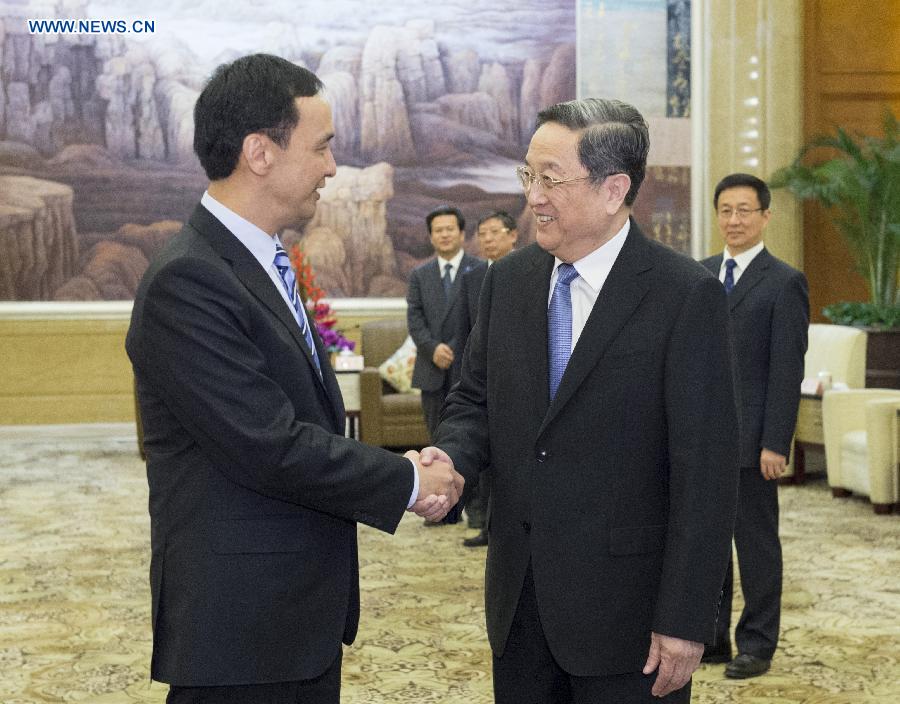
Yu Zhengsheng (R), a member of the Standing Committee of the Political Bureau of the Communist Party of China (CPC) Central Committee and chairman of the National Committee of the Chinese People's Political Consultative Conference (CPPCC), meets with Eric Chu, chairman of the Kuomintang (KMT), before the 10th Cross-Strait Economic, Trade and Culture Forum in Shanghai, east China, May 2, 2015. The 10th Cross-Strait Economic, Trade and Culture Forum, a regular forum between the Chinese mainland and Taiwan, opened in Shanghai on Sunday. (Xinhua/Wang Ye)
SHANGHAI -- The 10th Cross-Strait Economic, Trade and Culture Forum, a regular meeting between the Chinese mainland and Taiwan, opened Sunday in Shanghai.
Yu Zhengsheng, top political advisor and senior leader of the Communist Party of China (CPC), and Eric Chu, chairman of the Kuomintang (KMT), attended the opening ceremony.
On behalf of the CPC Central Committee and Xi Jinping, general secretary of the CPC Central Committee, Yu, a member of the Standing Committee of the Political Bureau of the CPC Central Committee, congratulated on the forum.
In his speech, Yu said the mainland and Taiwan should discuss ways for the island to participate in the Asian Infrastructure Investment Bank (AIIB).
Talks may also encompass the Belt and Road Initiative and some regional economic cooperation opportunities, to develop the international market and improve the competitiveness of the whole Chinese economy, he said.
The two sides should assure the peaceful development of relations by adhering to the 1992 Consensus and opposing "Taiwan independence", according to Yu, who is also chairman of the National Committee of the Chinese People's Political Consultative Conference.
"Contact and exchange between young people from both sides will help them realize their dreams," Yu said, calling for a better deal for young people living, studying, working or starting businesses away from their hometowns on the other side of the Taiwan Strait, regardless of where they originate.
Yu asked the forum to continue its focus on welfare with exchanges of economic policy and industrial plans. Efforts to help ordinary people, small and medium-sized enterprises as well as farmers and fishermen should be considered, he said.
The forum should invite opinion from a wider spectrum of people to cover both major issues of cross-Strait development and specific practical matters.
Yu recalled that when the cross-Strait relations were experiencing a turbulent time 10 years ago, the first Cross-Strait Economic, Trade and Culture Forum was proposed by the CPC and the KMT with the two sides' resolve to contain "Taiwan independence" forces and seek historic reconciliation, cross-Strait peace and benefits for compatriots on both sides.
Over the last decade, the forum has always followed the 1992 Consensus, opposed "Taiwan independence" and acted as an important platform for CPC-KMT dialogue, Yu said, noting that the total 153 joint proposals reached at the forum, most of which have been turned into practical policies, have brought solid benefit to people on both sides.
Pledging better cross-Strait development, Chu said in his speech that the KMT would be held responsible by the public, the next generation and history.
He said the peaceful development must continue and efforts should be made on cross-Strait exchanges and to make the achievements in cross-Strait development accessible to more.
He said the KMT will work on the basis of the 1992 Consensus.
Sunday's forum, presided over by Zhang Zhijun, head of the Taiwan Work Office of the CPC Central Committee, and Huang Ming-hui, KMT vice chair, was attended by over 300 people including representatives of the two parties and some other political parties and groups, as well as businesspersons, scholars and young people from both sides of the Strait.
Ahead of the forum on Saturday, Yu met with Chu and his delegation.